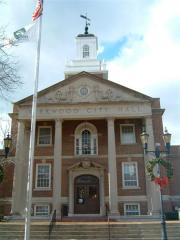Trouble in Kirkwood
At 7 p.m. on the evening of Thursday, February 7, Public Safety Editor Gauen was on his way out the door. It had been a quiet day in a string of quiet days. Gauen usually left the office closer to 8 p.m., and as he stopped to chat with Night Metro Editor Lisa Eisenhauer to help set the agenda for the evenings coverage, he remarked on the fact that he had been home early every day that week.

Kirkwood City Hall
But then Gauen noticed Photographer J.B. Forbes burst from the photo room. He comes running from the doorway, and the fact that he was moving so fast caught my eye, Gauen recalls. I could tell from the look on his face I was not going home. Gauen could not initially understand what Forbes was saying as he dashed across the newsroom toward the Metro section. But by the time Forbes reached Eisenhauers desk, it was clear why he was so distraught: He had heard on a newsroom police scanner that shots had been fired at a City Council meeting in Kirkwood, an affluent St. Louis County suburb.
Gauen himself had a stack of scanners on his desk, but since there were over 100 police municipalities in St. Louis, it was impossible to monitor all police radio traffic, and Gauen didnt try. Kirkwood was a reliably quiet little community, and Gauens scanners tended to be tuned to St. Louis larger, busier police departments. Yet now, even Gauens scanners were beginning to come alive with shouting voices. Gauen recalls:
The professionalism was ratcheted down. We were getting yelling and excited voices. I was getting talk of shootings [People saying]: We need more help. We need this. We need that. So this is reinforcing in my mind that this is real. Whatever this is, its big.
But Gauen could not decipher anything more specific than that shots had been fired. It was unclear whether anyone had been hurt or killed, who the shooter was, and whether that person was at large. We still had no idea of the magnitude, he says. We didnt know anything.
Listen to Gauen describe finding out about the shooting.
Length:
3 min 2 sec
Metro Editor Adam Goodman was concluding an evening meeting when he heard the commotion in the newsroom. As he rushed to join the others in the Metro section, his first instinct was to find out whether the Post-Dispatch had a reporter at the Kirkwood City Council meeting. The paper very well might not. The Metro coordinator, Carl Green, was in charge of assigning freelance reportersalso called stringersto attend such meetings, but the paper did not cover all of them. Green, who maintained the freelancer schedule, was nowhere in sight. So Goodman quickly sifted through the papers on Greens desk in search of the assignment calendar, finding at last that the Post-Dispatch did have a stringer at the meeting: Janet McNichols.
McNichols was a part-time reporter who had spent a 20-year career in public relations at Anheuser-Busch, an enormous commercial brewery based in St. Louis. Now retired, she devoted a few hours a week to writing and reporting for the Post-Dispatch , and by 2008 had covered city council meetings in Kirkwood and other St. Louis neighborhoods for several years. She had written hundreds of stories for the newspaper, mostly short dispatches from council meetings about zoning changes, public works projects, and development. In all of that time, she had filed stories by phone and email; consequently, none of the Metro editors had actually met McNichols.
Now she could be in serious danger. She had not contacted the newsroom. Editors did not know whether sheor anyonehad survived the reported attack. But she was also their best hope of finding out and reporting on what had happened. Night Metro Editor Eisenhauer retrieved McNichols cell phone number from the freelancer schedule and dialed.